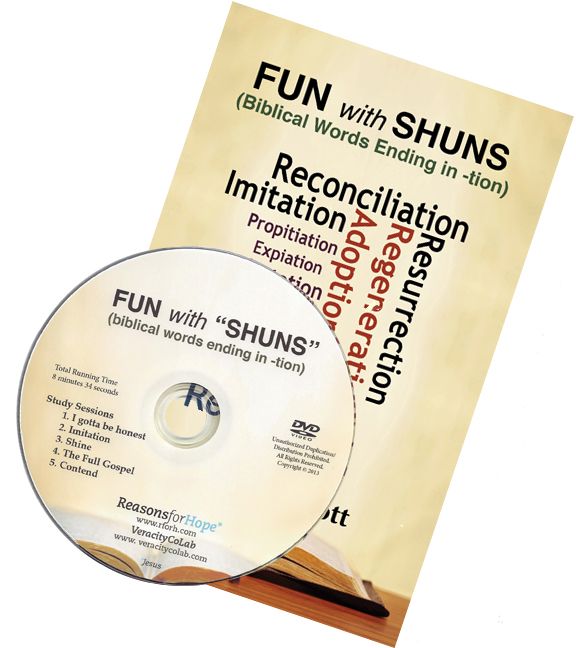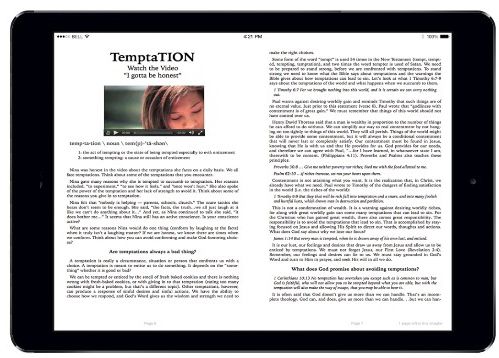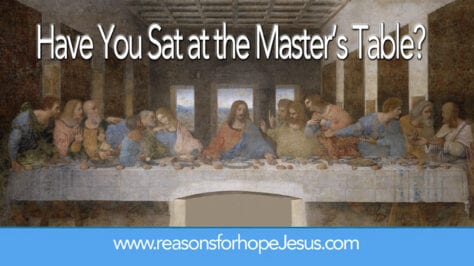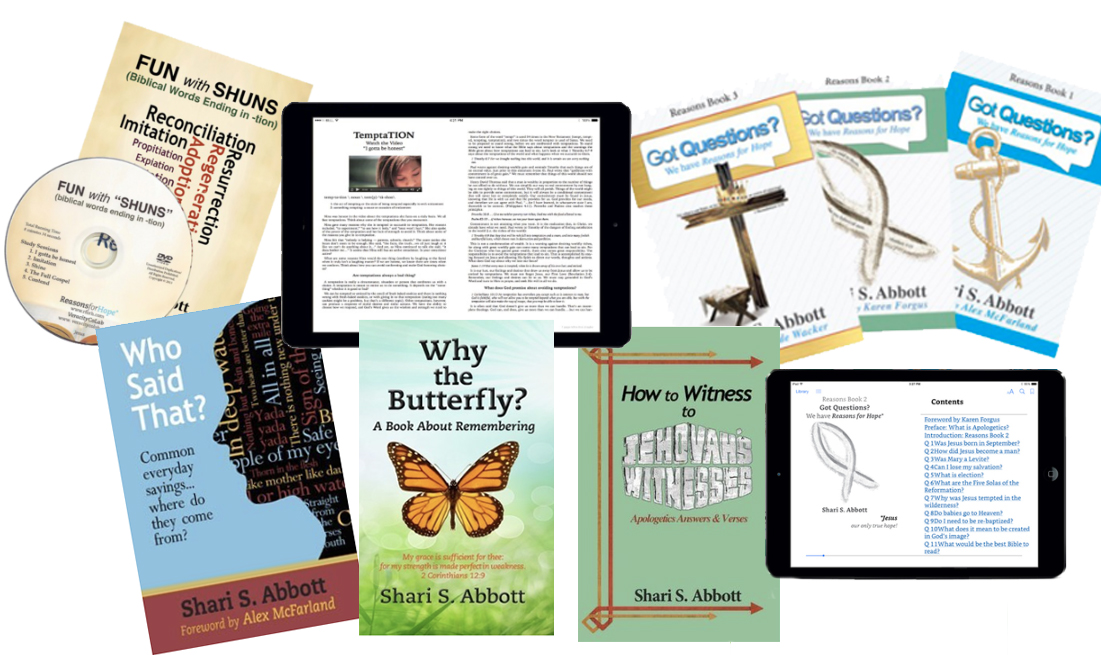By Shari Abbott, Reasons for Hope* Jesus
All Christians need to be familiar with core biblical teachings. Fun with Shuns is a quick, easy and fun way to learn biblical doctrines, or reinforce those that you already know. You can’t live and share your Christian faith, unless you first know what you believe and are able to clearly articulate it.
This past week in Got Questions? we answered “How should I witness to Jehovah’s Witnesses?” When we have knowledge of what we believe, Jesus wants us to share it. He gave us the great commission, to “go” and “make disciples.” We can only do that if we are ready, willing and able to open conversations of spiritual importance and tell people about Jesus.
This Fun with Shuns stresses the importance of being ready to give an answer for the hope that we have (1 Peter 3:15)…and then doing so in conversations.
Fun with Shuns
Application in ConversaTION
con·ver·sa·tion \ noun \ kän-vər-sā-shən\
1: oral exchange of sentiments, observations, opinions, or ideas
2: an instance of such exchange: talk <a quiet conversation>
An increased knowledge of biblical teachings is of little benefit without application. Application begins when we “hide God’s Word in our hearts” and allow His Spirit to work in and through us. Increased knowledge is important because it equips us to know what we believe, and by application we live what we believe and we share what we believe with others.
We are called to be Jesus’ ambassadors on this earth, to do His good will (2 Corinthians 5:20), and to proclaim His message of saving grace to all people.
Mark 16:15 And [Jesus] said unto them, Go into all the world, and preach the gospel to every creature.
Jesus’ commission to “preach the gospel” is not meant in a formal sense, such as the presentation of a pastor to a congregation of people. Our presentation, our preaching of the gospel, should be a conversation with family members, friends and acquaintances.
The apostle Peter encourages all Christians to “…sanctify the Lord God in your hearts: and be ready always to give an answer to every man that asks you a reason of the hope that is in you…” (1 Peter 3:15).
The Greek word for “answer” in 1 Peter 3:15 is “apologia.” Apologia means an answer with a “defense.” This means speaking the truths of God that will defend against all worldly lies. So Peter clearly encourages us to be ready with biblical knowledge (answers) and to share our knowledge with “every man.” We can only do that by having conversations of spiritual importance. Peter also reminds us that our conversation is to be “with meekness and fear” (1 Peter 3:15)—that means with gentleness and respect.
Holy Conversation
Over time the meaning of the word conversation has changed. Looking back to the 17th century, and even as late as the 19th century, the word conversation had a much broader meaning.
The 1828 Webster’s American Dictionary conveys this broader meaning with a definition based not only on spoken discourse, but also on behavior.
1. General course of manners; behavior; deportment; especially as it respects morals.
Let your conversation be as becomes the gospel. Phil 1:27
Be ye holy in all manner of conversation. 1 Peter 1
2. A keeping company; familiar intercourse; intimate fellowship or association; commerce in social life. Knowledge of men and manners is best acquired by conversation with the best company.
3. Intimate and familiar acquaintance; as a conversation with books, or other object.
4. Familiar discourse; general intercourse of sentiments; chat; unrestrained talk; opposed to a formal conference. [This is now the most general use of the word.]
We find this broader meaning of conversation used in the 1611 King James Bible. The English word “conversation” in 1611 included conduct as well as words. Paul in writing to the church at Philippi instructed them, “Only let your conversation be as it becometh the gospel of Christ…” (Philippians 1:27, KJV).
The Greek word that Paul used is “politeuomai,” which means to behave as a citizen. It’s important that we share our faith with others and it’s also of great importance that we do so “in a manner that becomes the gospel.” What we say, and how we say it, is a reflection on the King we serve.
As Peter wrote, “be ready always to give an answer” in kindness, and, as Paul encouraged, “let your conduct be worthy of the gospel of Christ.” Therefore, let us always be kindly and bold when we share the gospel.
The apostle Jude also wrote about the importance of defending our faith. He echoed Peter’s words, when he wrote that Christians, in all times, are to contend for the faith, not fall prey to the deceptions that will come, not be shaken by attacks on their faith or influenced by the twisting of God’s Word. In verse 3 of his letter, Jude exhorts Christians to “earnestly contend for the faith.”
When we know what we believe, and when we live what we believe, then we are equipped and ready to share what we believe. Contend for the faith with confidence and with good conversation (conduct). End your study of “shuns” with this inspiring and motivational video:
<*}}}><
Fun with Shuns Book and DVD or iBook
Fun with Shun is now available as a PRINT BOOK with DVD or as an iBook with videos embedded.
Read more Power of Hope articles click here.
Sign up & receive articles in your inbox. Sign Up Here
The Top Ten Got Questions? of 2015
- Is my TATTOO a sin?
- Is SUICIDE an Unforgivable Sin?
- Is It a Sin to Drink Alcohol?
- The Meaning of Colors in the Bible? /The Meaning of Numbers in the Bible?
- What is the unpardonable sin? What if I commit it?
- Is it a sin to be fat?
- Can Jews go to Heaven without knowing Jesus?
- Is there a hidden message in Rev 7? Why is Dan missing?
- Did Jesus descend into Hell?
- Where did OT saints go at death? What’s Abraham’s Bosom?
Recent Got Questions?
- Does God create EVIL as Isaiah 45:7 says?
- Are we the Bride of Christ now or is that future?
- Is there an ERROR in Genesis 2:17 because Adam and Eve didn’t die?
- Are the Jews of today still the CHOSEN people of God?
- Is there a HIDDEN MESSAGE in Revelation 7?
- How should I WITNESS to Jehovah’s Witnesses?
- What do the 12 stones UNDER the Jordan River mean?
























